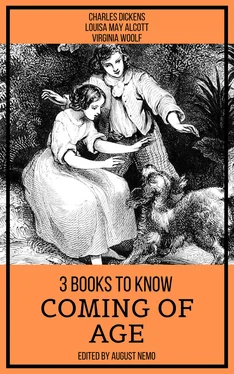Why I was trying to pack mine into my tumbler, I am wholly unable to say. I only know that I found myself, with a perseverance worthy of a much better cause, making the most strenuous exertions to compress it within those limits. Again I thanked him and apologized, and again he said in the cheerfullest manner, "Not at all, I am sure!" and resumed.
"There appeared upon the scene—say at the races, or the public balls, or anywhere else you like—a certain man, who made love to Miss Havisham. I never saw him, for this happened five-and-twenty years ago (before you and I were, Handel), but I have heard my father mention that he was a showy-man, and the kind of man for the purpose. But that he was not to be, without ignorance or prejudice, mistaken for a gentleman, my father most strongly asseverates; because it is a principle of his that no man who was not a true gentleman at heart, ever was, since the world began, a true gentleman in manner. He says, no varnish can hide the grain of the wood; and that the more varnish you put on, the more the grain will express itself. Well! This man pursued Miss Havisham closely, and professed to be devoted to her. I believe she had not shown much susceptibility up to that time; but all the susceptibility she possessed, certainly came out then, and she passionately loved him. There is no doubt that she perfectly idolized him. He practised on her affection in that systematic way, that he got great sums of money from her, and he induced her to buy her brother out of a share in the brewery (which had been weakly left him by his father) at an immense price, on the plea that when he was her husband he must hold and manage it all. Your guardian was not at that time in Miss Havisham's councils, and she was too haughty and too much in love, to be advised by any one. Her relations were poor and scheming, with the exception of my father; he was poor enough, but not time-serving or jealous. The only independent one among them, he warned her that she was doing too much for this man, and was placing herself too unreservedly in his power. She took the first opportunity of angrily ordering my father out of the house, in his presence, and my father has never seen her since."
I thought of her having said, "Matthew will come and see me at last when I am laid dead upon that table;" and I asked Herbert whether his father was so inveterate against her?
"It's not that," said he, "but she charged him, in the presence of her intended husband, with being disappointed in the hope of fawning upon her for his own advancement, and, if he were to go to her now, it would look true—even to him—and even to her. To return to the man and make an end of him. The marriage day was fixed, the wedding dresses were bought, the wedding tour was planned out, the wedding guests were invited. The day came, but not the bridegroom. He wrote her a letter—"
"Which she received," I struck in, "when she was dressing for her marriage? At twenty minutes to nine?"
"At the hour and minute," said Herbert, nodding, "at which she afterwards stopped all the clocks. What was in it, further than that it most heartlessly broke the marriage off, I can't tell you, because I don't know. When she recovered from a bad illness that she had, she laid the whole place waste, as you have seen it, and she has never since looked upon the light of day."
"Is that all the story?" I asked, after considering it.
"All I know of it; and indeed I only know so much, through piecing it out for myself; for my father always avoids it, and, even when Miss Havisham invited me to go there, told me no more of it than it was absolutely requisite I should understand. But I have forgotten one thing. It has been supposed that the man to whom she gave her misplaced confidence, acted throughout in concert with her half-brother; that it was a conspiracy between them; and that they shared the profits."
"I wonder he didn't marry her and get all the property," said I.
"He may have been married already, and her cruel mortification may have been a part of her half-brother's scheme," said Herbert.
"Mind! I don't know that."
"What became of the two men?" I asked, after again considering the subject.
"They fell into deeper shame and degradation—if there can be deeper—and ruin."
"Are they alive now?"
"I don't know."
"You said just now, that Estella was not related to Miss Havisham, but adopted. When adopted?"
Herbert shrugged his shoulders. "There has always been an Estella, since I have heard of a Miss Havisham. I know no more. And now, Handel," said he, finally throwing off the story as it were, "there is a perfectly open understanding between us. All that I know about Miss Havisham, you know."
"And all that I know," I retorted, "you know."
"I fully believe it. So there can be no competition or perplexity between you and me. And as to the condition on which you hold your advancement in life—namely, that you are not to inquire or discuss to whom you owe it—you may be very sure that it will never be encroached upon, or even approached, by me, or by any one belonging to me."
In truth, he said this with so much delicacy, that I felt the subject done with, even though I should be under his father's roof for years and years to come. Yet he said it with so much meaning, too, that I felt he as perfectly understood Miss Havisham to be my benefactress, as I understood the fact myself.
It had not occurred to me before, that he had led up to the theme for the purpose of clearing it out of our way; but we were so much the lighter and easier for having broached it, that I now perceived this to be the case. We were very gay and sociable, and I asked him, in the course of conversation, what he was? He replied, "A capitalist—an Insurer of Ships." I suppose he saw me glancing about the room in search of some tokens of Shipping, or capital, for he added, "In the City."
I had grand ideas of the wealth and importance of Insurers of Ships in the City, and I began to think with awe, of having laid a young Insurer on his back, blackened his enterprising eye, and cut his responsible head open. But, again, there came upon me, for my relief, that odd impression that Herbert Pocket would never be very successful or rich.
"I shall not rest satisfied with merely employing my capital in insuring ships. I shall buy up some good Life Assurance shares, and cut into the Direction. I shall also do a little in the mining way. None of these things will interfere with my chartering a few thousand tons on my own account. I think I shall trade," said he, leaning back in his chair, "to the East Indies, for silks, shawls, spices, dyes, drugs, and precious woods. It's an interesting trade."
"And the profits are large?" said I.
"Tremendous!" said he.
I wavered again, and began to think here were greater expectations than my own.
"I think I shall trade, also," said he, putting his thumbs in his waistcoat pockets, "to the West Indies, for sugar, tobacco, and rum. Also to Ceylon, specially for elephants' tusks."
"You will want a good many ships," said I.
"A perfect fleet," said he.
Quite overpowered by the magnificence of these transactions, I asked him where the ships he insured mostly traded to at present?
"I haven't begun insuring yet," he replied. "I am looking about me."
Somehow, that pursuit seemed more in keeping with Barnard's Inn. I said (in a tone of conviction), "Ah-h!"
"Yes. I am in a counting-house, and looking about me."
"Is a counting-house profitable?" I asked.
"To—do you mean to the young fellow who's in it?" he asked, in reply.
"Yes; to you."
"Why, n-no: not to me." He said this with the air of one carefully reckoning up and striking a balance. "Not directly profitable. That is, it doesn't pay me anything, and I have to—keep myself."
Читать дальше












